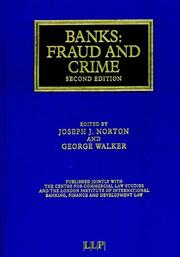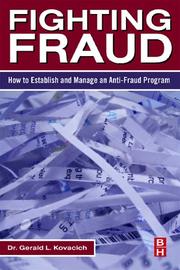| Listing 1 - 10 of 222 | << page >> |
Sort by
|
Book
Year: 2018 Publisher: Basel : MDPI - Multidisciplinary Digital Publishing Institute,
Abstract | Keywords | Export | Availability | Bookmark
 Loading...
Loading...Choose an application
- Reference Manager
- EndNote
- RefWorks (Direct export to RefWorks)
Corporate crimes seem endemic to modern society. The newspapers are filledon a daily basis with examples of financial manipulation, accounting fraud, foodfraud, cartels, bribery, toxic spills and environmental harms, corporate humanrights violations, insider trading, privacy violations, discrimination, corporatemanslaughter or violence, and, recently, software manipulation. Clearly, theproblem of corporate crime transcends the micro level of the individual 'rottenapple': although corporate crimes are ultimately committed by individualmembers of an organization, they have more structural roots, as the enablingand justifying organizational context in which they take place plays a definingrole. Organizations provide individuals with positions, incentives, networks, rules,routines, perceptions and beliefs, that structure the opportunities for crime. Thus,organizational factors can explain how misconduct in organizations is defined,perceived, normalized, organized, and facilitated on the one hand, and controlledand prevented on the other hand.Organization studies have a long tradition of studying misconduct and deviance inorganizational contexts. This Special Issue of Administrative Sciences focuses onthe organizational and administrative aspects of a broad spectrum of corporateand organizational crimes.
Book
ISBN: 1803566965 Year: 2023 Publisher: London : IntechOpen,
Abstract | Keywords | Export | Availability | Bookmark
 Loading...
Loading...Choose an application
- Reference Manager
- EndNote
- RefWorks (Direct export to RefWorks)
This book is a collection of chapters on corruption. It highlights the importance of corruption, transparency, and accountability and ways to deal with it. Understanding the types of corruption is very important to know how to deal with it. Types of corruption include bribery, lobbying, extortion, cronyism, nepotism, parochialism, patronage, influence peddling, graft, embezzlement, double-dealing, under-the-table transactions, manipulating elections, diverting funds, laundering money, and defrauding investors. Identifying corruption in all its forms requires analyzing the country and its political system and laws and rooting out the sources of corruption and the people behind it. Corruption and those participating in it must be identified to find ways to deal with it, including installing proper governance mechanisms with complete transparency and accountability for politicians, people in power, and/or citizens, as well as applying rules and holding those who infringe them accountable. This book provides a comprehensive overview of the many types of corruption and how to handle them.
Book
ISBN: 0128045329 0128044942 9780128045329 9780128044940 Year: 2016 Publisher: Amsterdam, [Netherlands] : Academic Press,
Abstract | Keywords | Export | Availability | Bookmark
 Loading...
Loading...Choose an application
- Reference Manager
- EndNote
- RefWorks (Direct export to RefWorks)
Commercial crimes --- Investigation. --- Criminal investigation
Book
ISBN: 1315574772 1317158024 1317158016 1282892355 9786612892356 1409412601 Year: 2010 Publisher: Farnham, Surrey ; Burlington, VT : Gower,
Abstract | Keywords | Export | Availability | Bookmark
 Loading...
Loading...Choose an application
- Reference Manager
- EndNote
- RefWorks (Direct export to RefWorks)
This volume examines the causes and consequences of crime and corruption in organizations, and the choices we face in our efforts to eradicate these social maladies. This is the most up-to-date thinking on both classic and novel approaches to crime and corruption, as well as the most scientifically-grounded approaches to reducing illicit behaviour in organizations.
Corporations --- Business ethics. --- Commercial crimes. --- Corrupt practices.

ISBN: 1317751817 1315796864 1317751825 9781317751823 9781315796864 1859785506 9781859785508 Year: 2000 Publisher: London
Abstract | Keywords | Export | Availability | Bookmark
 Loading...
Loading...Choose an application
- Reference Manager
- EndNote
- RefWorks (Direct export to RefWorks)
Banks: Fraud and Crime explores the main issues which arise in bank fraud world-wide and looks at the possible options available for corrective action. A series of leading commentators examine the basic nature of bank fraud and financial crime, comparing the legal and regulatory framework in England to those in place in the USA and elsewhere. Banks: Fraud and Crime also takes a detailed look at the core issue of money laundering at a national, regional and international level as well as considering the many other complex issues arising from bank fraud and financial crime.
Bank fraud --- Banking law --- Commercial crimes. --- Criminal provisions.

ISBN: 1281029319 9786611029319 0080550983 9780080550985 0123708680 9780123708687 9781281029317 6611029311 Year: 2008 Publisher: Amsterdam Boston Elsevier/Butterworth-Heinemann
Abstract | Keywords | Export | Availability | Bookmark
 Loading...
Loading...Choose an application
- Reference Manager
- EndNote
- RefWorks (Direct export to RefWorks)
This practical reference provides the basics for instituting a corporate anti-fraud program that helps prepare corporate security professionals and other corporate managers for fighting corporate fraud from inside the company. It provides an exceptional foundation for security professionals or business executives involved in developing and implementing a corporate anti-fraud program as part of a corporate assets protection program.The author's intent is to provide the reader with a practitioner's guide (a "how-to? book), augmented by some background information to put it all in perspec
Commercial crimes. --- Commercial crimes --- Fraud --- Fraud investigation. --- Criminal investigation --- Corporate crime --- Crimes, Financial --- Financial crimes --- Offenses affecting the public trade --- Crime --- Investigation. --- Prevention.
Book
ISBN: 0128013494 0128012218 9780128013496 9780128012215 Year: 2016 Publisher: Amsterdam, [Netherlands] : Academic Press,
Abstract | Keywords | Export | Availability | Bookmark
 Loading...
Loading...Choose an application
- Reference Manager
- EndNote
- RefWorks (Direct export to RefWorks)
Commercial crimes. --- Corporate crime --- Crimes, Financial --- Financial crimes --- Offenses affecting the public trade --- Crime
Book
ISBN: 1283628503 9786613940957 3110285843 9783110285840 9781283628501 9783110283167 Year: 2012 Publisher: Berlin Walter de Gruyter
Abstract | Keywords | Export | Availability | Bookmark
 Loading...
Loading...Choose an application
- Reference Manager
- EndNote
- RefWorks (Direct export to RefWorks)
Der Tagungsband zum Symposion "Unternehmensstrafrecht", das im Rahmen der Reihe "Economy, Criminal Law, Ethics" (ECLE) am Institute for Law and Finance in Frankfurt am Main Ende November 2011 stattfand, beginnt mit einer Reflexion der gesellschaftspolitischen Impulse für eine stärkere Gemeinwohlorientierung von Unternehmen. Daran schließen sich Betrachtungen über die Einflüsse der europäischen Rechts- und Wirtschaftspolitik auf eine Intensivierung und Erweiterung der Unternehmenshaftung an. Die Überleitung dieser Thematik in die interdisziplinäre Behandlung der Probleme wird unterbrochen durch eine Bestandsaufnahme der gegenwärtigen Rechtslage in Deutschland, die im wesentlichen durch ein entsprechendes Ordnungswidrigkeitenrecht gekennzeichnet ist, und exemplarische Darstellungen ausländischer Regelungen (z.B. Spanien, USA). Die substanziellen Grundfragen werden dann aus soziologischer, ökonomischer, psychologischer und philosophischer Sicht beantwortet. In einem weiteren Abschnitt werden legislatorische Konzepte eines Unternehmensstrafrechts unter Berücksichtigung aktueller kriminalpolitischer Überlegungen erörtert. Der letzte Teil ist Alternativen gewidmet, für die sich eine europakonforme deutsche Gesetzgebung unter Berücksichtigung verfassungsrechtlicher Bedenken entscheiden könnte. In einem Ausblick wird ein Modell vorgestellt, das die großen Schwierigkeiten zu überwinden versucht, die sich aus dem Nebeneinander kollektiver und individueller Verantwortlichkeit ergeben.
Commercial crimes --- Corporate crime --- Crimes, Financial --- Financial crimes --- Offenses affecting the public trade --- Crime --- Tort Law.
Book
ISBN: 9004207155 9789004207158 9789004207141 9004207147 Year: 2013 Publisher: Leiden : Martinus Nijhoff Publishers,
Abstract | Keywords | Export | Availability | Bookmark
 Loading...
Loading...Choose an application
- Reference Manager
- EndNote
- RefWorks (Direct export to RefWorks)
In Rethinking Money Laundering andamp; Financing of Terrorism in International Law: Towards a New Global Legal Order , Roberto Durrieu provides a broad and original analysis of the phenomenon of money laundering, through a thorough examination of the financing of terrorism. The necessity of excluding the financing of terrorism from the legal definition of money laundering is clearly illustrated through extensive, original and comparative research. In addition, the book advocates the recognition of money laundering as an international crime strictu sensu that can be tried by a special international tribunal. The hidden, mutable, complex and global nature of the crime must be addressed multilaterally through a new, integrated and more effective global legal order which is consistent and compatible with civil guarantees and human rights principles. Part I studies the main extra-legal and legal aspects of money laundering by analyzing the meaning, causes and effects of this phenomenon and their link with the financing of terrorism, with special attention to the interconnection between the so-called preventive/regulatory AML-CFT system and the punitive approach. Part II provides a global-comparative analysis to determine whether or not the adoption of money laundering offences is consistent with sound principles of criminal law and criminal procedure. Finally, Part III examines the jurisdictional problems with respect to extra-territorial and large-scale money laundering cases. The book offers nuanced and thought-provoking answers to questions regarding the prohibition of money laundering, the financing of terrorism, and the relationship between them, the current state of associated International Law, the need for future action, and the human rights consequences of these crimes.
Money laundering. --- Terrorism --- Laundering of money --- Money washing --- Washing of money --- Commercial crimes --- Finance.
Book
ISBN: 1536105449 9781536105445 9781536105438 1536105430 Year: 2017 Publisher: New York
Abstract | Keywords | Export | Availability | Bookmark
 Loading...
Loading...Choose an application
- Reference Manager
- EndNote
- RefWorks (Direct export to RefWorks)
Money laundering. --- Money laundering --- Laundering of money --- Money washing --- Washing of money --- Commercial crimes
| Listing 1 - 10 of 222 | << page >> |
Sort by
|

 Search
Search Feedback
Feedback About UniCat
About UniCat  Help
Help News
News